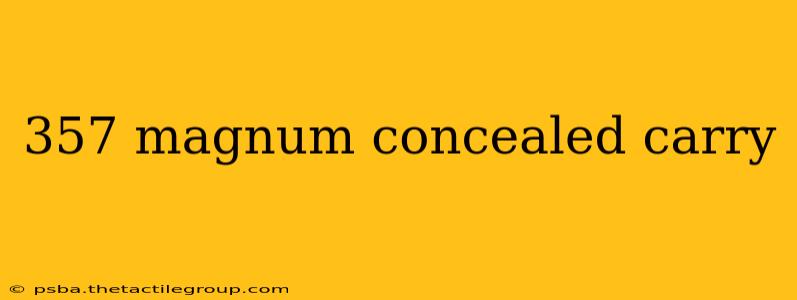The .357 Magnum remains a potent cartridge, captivating shooters with its stopping power and versatility. However, concealed carry with such a round presents unique challenges and considerations. This guide delves into the realities of carrying a .357 Magnum for self-defense, weighing the advantages and disadvantages to help you make an informed decision.
The Allure of the .357 Magnum for Concealed Carry
The .357 Magnum's reputation precedes it. Its substantial stopping power, stemming from its heavier bullet weight and higher velocity compared to many other calibers, is undeniably attractive for self-defense. This makes it a popular choice for those prioritizing maximum effectiveness in a life-threatening situation. The availability of both full-metal jacket (FMJ) and jacketed hollow point (JHP) ammunition further enhances its versatility for different applications.
Advantages of a .357 Magnum for Concealed Carry:
- Stopping Power: The .357 Magnum's high energy transfer significantly increases the likelihood of stopping a threat quickly and decisively.
- Versatility: The cartridge offers a broad range of ammunition choices, allowing customization based on your specific needs and preferences.
- Penetration: .357 Magnum rounds can penetrate barriers more effectively than some smaller calibers, crucial in self-defense scenarios.
The Challenges of Concealed Carrying a .357 Magnum
While the stopping power is undeniable, carrying a .357 Magnum concealed comes with significant drawbacks. These challenges shouldn't be underestimated.
Disadvantages of a .357 Magnum for Concealed Carry:
- Recoil: The substantial recoil is the biggest hurdle. Managing recoil effectively requires significant practice and strength, impacting accuracy and follow-up shots. This is particularly crucial under stress. For many, the recoil makes it uncomfortable or even impractical for concealed carry.
- Size and Weight: .357 Magnum revolvers, while available in smaller frames, are generally larger and heavier than comparable handguns chambered in smaller calibers like 9mm or .38 Special. This adds to the bulk and comfort issues for concealed carry.
- Capacity: Revolvers typically have lower magazine capacity than semi-automatic pistols, limiting the number of rounds available in a self-defense situation.
- Ammo Weight: Carrying enough ammunition significantly increases the overall weight carried, adding to the discomfort.
Choosing the Right Firearm and Ammunition
If you're determined to carry a .357 Magnum, careful selection of both firearm and ammunition is paramount.
Firearm Considerations:
- Revolver Selection: Look for revolvers with lighter frames and shorter barrels to minimize weight and size for concealed carry. Consider models with improved grips to manage recoil effectively. Proper fitting is critical.
- Practice: Extensive practice is essential to master recoil management and achieve consistent accuracy. Dry firing and live fire practice are both vital.
Ammunition Selection:
- Defensive Ammunition: Prioritize high-quality jacketed hollow point (JHP) ammunition designed for self-defense. Different JHP designs offer varying performance characteristics, so research is vital to find what best suits your needs.
- Practice Ammunition: Use affordable FMJ ammunition for practice to keep training costs manageable.
Alternatives to Consider
Before committing to a .357 Magnum for concealed carry, consider alternative calibers offering a better balance of stopping power, manageable recoil, and concealability. Calibers like 9mm, .40 S&W, and .38 Special are all popular choices for concealed carry and offer a lower recoil profile while maintaining substantial stopping power.
Conclusion
The .357 Magnum's stopping power is undeniably attractive for concealed carry, but the challenges associated with its recoil, size, weight, and capacity should not be ignored. Thorough consideration of these factors, along with extensive training, is crucial before making this potentially powerful, yet demanding, choice for personal protection. Ultimately, the best caliber for concealed carry depends heavily on individual needs, physical capabilities, and training. Consult with experienced firearms instructors and professionals to make the most informed decision.

